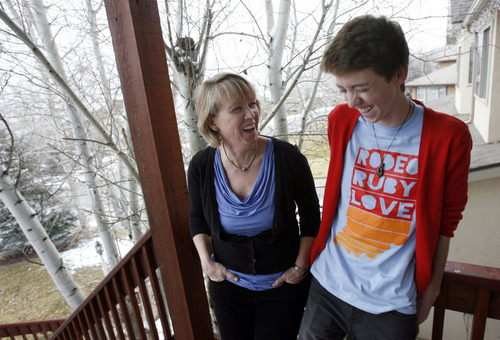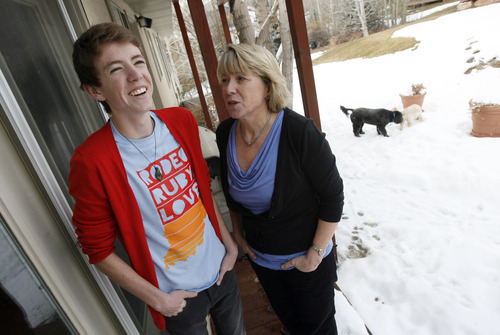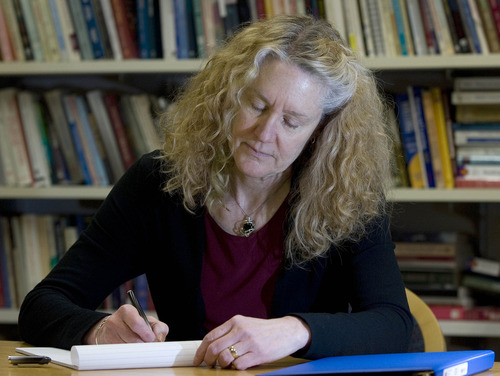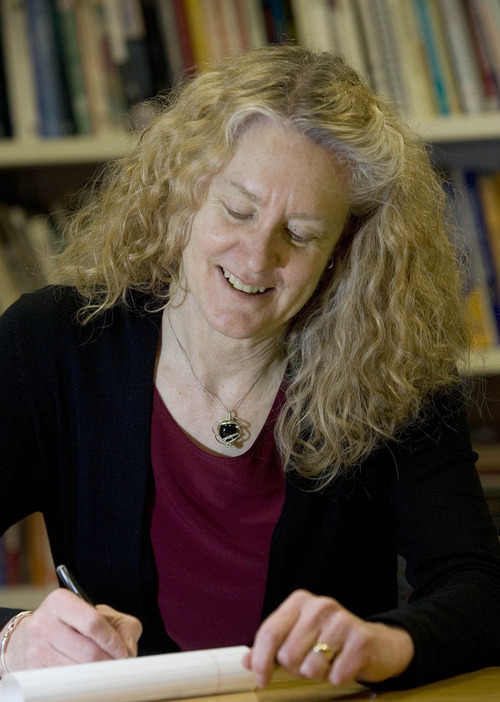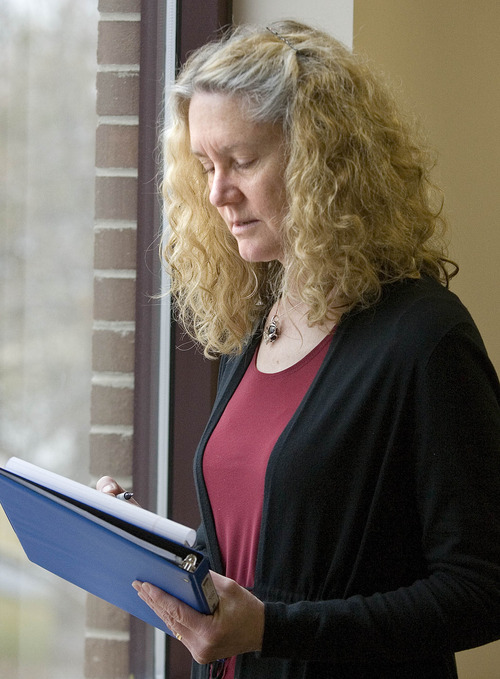This is an archived article that was published on sltrib.com in 2011, and information in the article may be outdated. It is provided only for personal research purposes and may not be reprinted.
Hobbled by doctors who seemed unable to diagnose the rare intestinal disorder that wracked her 14-year-old son's body with constant pain, Vicki Whiting never thought about documenting her experience in a book.
When her son Kevin finally recovered, Whiting knew she had to write it all down. She also knew she should include accounts from her son, who suffered years of pain so intense he ripped up phone books for distraction.
"When your family survives something like that, you just want to move past it as quickly as possible," said Whiting, a Westminster College business professor. "It would have been a very different book had we waited."
Published last month, the mother-son book, In Pain We Trust : A Conversation Between Mother and Son on the Journey from Sickness to Health, has since been adopted by Westminster College's nursing school as part of its curriculum. Nursing programs at universities nationwide have also expressed interest in using the book to underline the need for "patient-centered care" in the nation's health-care system.
Poet Susan Sample met the trials of sickness first-hand through family members, too — her father is in remission from his third type of cancer, her mother died in 2008 from lupus — but also through years of teaching verse.
Doctors, medical students and people confronting transplants and terminal conditions have all learned from her published poetry, as well as her position as an associate in the division of medical ethics and humanities at the University of Utah's School of Medicine.
Her poetic observations culminated this fall in the publication of Terrible Grace, collecting several poems recognized with a first-place award for original writing in 2009 by the Utah Arts Council. Sample dedicated the collection to the memory of her mother, Bette Jane Mooney Sample.
Where the Whitings offer a narrative survival guide for navigating the maze of obtaining an accurate diagnosis and effective treatment, Sample's book charts the ways disease and mortality call people to articulate their way through fear and pain and, hopefully, into grace and wisdom.
"Poetry is beneficial in that it doesn't require an end," Sample said. "With poetry, we don't quite know what the conclusion is. Instead, it enables us to capture peak moments to make meaning of. I think that's why so many patients find it meaningful."
The books are very different, ranging from the Whitings' pragmatic, here's-what-must-be-done narrative of a mother-son team, to the terse, eloquently jarring verse of Sample, yet both start from an identical assumption. Illness demands a response — and when all else fails, writing can make up the difference.
Kevin, now 17, was cured by surgery that untangled an artery from his intestines that prevented him from absorbing nutrients. Writing the book with his mother, he said, was "the opposite of therapeutic." Instead, it was written to help other families struggling through ailments that often elude doctors, leading patients to take the wheel from medical professionals until effective treatment is found.
Even so, the book reveals ways in which Kevin and his mother coped through years of misery and uncertainty, from the summer of 2007 when his symptoms surfaced, to fall 2009 when his agony began to subside. He gave his pain a name, "Burnie," and even an identity as something more akin to a "horror show" as opposed to real life. "Imagining the pain as a person helped me bring myself away from it," Kevin said.
In contrast, Sample views illness more through the lens of a diagnostician prescribing words as treatment. She's spent 10 summers teaching poetry to teenagers who've survived organ transplants, in addition to teaching courses on the rhetoric of health and medicine at the University of Utah.
People asking about her work often assume she counsels patients at their bedside in the hospital. Her preferred environment by far is outside the hospital, where Sample said people undergoing treatment feel more like individuals than patients.
"The biggest value writing provides is the opportunity to figure out who you are in terms of illness," Sample said. "When you're outside the hospital, you get to decide what those terms are."
The need to "figure out who you are" holds true for family members as well. "Lullaby," a poem included in Terrible Grace, was written after Sample accompanied her father on a doctor's visit.
For Vicki Whiting, the ordeal of watching her child suffer taught her the importance of drawing those terms. Also, the realization that, like the origin of illness, the forces that drive people are never fully known until investigated and described in words.
"Whatever we see in another person is just a small portion of what's revealed," Whiting said. "We all have our stories."
Twitter:@Artsalt —
In Pain We Trust: A Conversation Between Mother and Son on the Journey from Sickness to Health
By • Vicki and Kevin Whiting
Publisher • Blooming Twig Books
Pages • 235
Price • $18.95
Excerpt (by Kevin Whiting)
"A lot of the stuff that happened in the hospital that second visit kind of lives in my brain like a horror movie. … The climax of the horror movie would come when the hero is told maybe these tiny little specks of grain in his intestines might be causing the problem. The evil doctor hooks the hero's feeding tube up to a special cleanser and pumps the tubes full of some special liquid to 'clean out the pipes.' Too soon the hero's body is so full of the liquid that the liquid is spurting out of his body everywhere, like some crazy cartoon."
Terrible Grace
By • Susan Sample
Publisher • Finishing Line Press
Pages •23
Price • $14
Excerpt from 'Lullaby'
I dream of a needle
boring into my back,
searching for furrows
in discs of bone. Last
week, my dad's blood
drenched piles of gauze.
Look away,
the oncologist said,
drawing marrow
from his pelvic wing.
He feels only pressure,
no pain. Hurt
sounds different: a knock
after midnight when winds
moan 'round the door
and joints unhinge. Now
I bend into notes
bruised as the winter sky.


